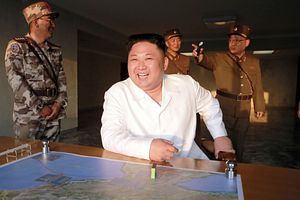Whenever North Korea launches a missile, there is a lot analysis about why now.
Here are a couple of typical theories: The launch was to mark an important North Korean holiday. It was to draw attention from a South Korean political event to the North. It was to send a message to North Korea’s most feared enemy, the United States.
Patterns exist to support these views and some test dates are likely more than coincidences. Some tests may have happened, however, just because the rocket was ready. If Kim Jong-un believes he’s in a race against time to secure undeniable nuclear deterrence, as some analysts believe, why wait to blast off?
In an interview with The Diplomat and other foreign media last week, Thae Yong-ho, North Korea’s former deputy ambassador to the U.K., said when Kim receives word a new test is prepared, he doesn’t hesitate to say go, no matter what else is going on around him. And it’s been that way in the Kim family for a long time, says Thae.
“The development of the nuclear project and ICBMs is not Kim Jong-un’s decision. North Korea’s nuclear project started long before his period,” he said.
According to Thae, who defected with his family to South Korea in 2016, missile and nuclear weapons development trumps all.
Since the inauguration of South Korean President Moon Jae-in on May 10, North Korea has test-launched three missiles, one every week. North Korea claims all three tests were successful, and many foreign governments and independent analysts seem to think so as well.
Thae says both defense and foreign policy are supposed to influence missile and nuclear development in North Korea. But Kim Jong-un is “standing in the middle” and the two sides never consult, he says. Kim hears from both generals and diplomats, and weapons testing wins out.
There are many examples of North Korea’s defense policy seeming to contradict foreign policy.
In February last year, China’s special representative for Korean Peninsula affairs, Wu Dawei, visited Pyongyang. Two days after Wu left, North Korea blasted off a rocket — meant, Pyongyang claimed, to put a satellite in space. Wu was in North Korea to discourage the launch. Perhaps he wasn’t convincing. Or perhaps, as Thae suggests, Kim won’t stop until he gets the nuclear deterrence he wants.
U.S. policymakers have also failed many times to deter North Korea’s weapons programs. The gradual death of the “Leap Day” agreement in February 2012 is notable. In brief, North Korea agreed to suspend missile and nuclear testing in return for U.S. food aid. About five weeks later, Pyongyang launched a rocket that exploded after takeoff. North Korea claimed it was trying to put a satellite into space, and that such efforts were not barred by the Leap Day agreement. The United States believed the launch was a poorly disguised ballistic missile test.
Later that year, North Korea tried again and managed to place a satellite in orbit. The United States again saw the launch as a missile test. Pyongyang would go on to conduct its first nuclear test under Kim Jong-un early the following year.
In Thae’s view, the 2012 diplomacy with the U.S. was just a way to “buy time” until North Korea’s defense industry was ready to test another missile or nuclear device. He says a decade of U.S. efforts to end North Korea’s nuclear program, which began under former President Bill Clinton, amounted to more of the same.
Thae also said North Korea never believed in the famous June 15 North-South Joint Declaration between Supreme Leader Kim Jong-il and late South Korean President Kim Dae-jung. That deal in 2000 marked the beginning of the Sunshine era, a time when the North and South expanded economic exchanges. Critics of the policy say most of the cash earned by North Korea through joint projects was channeled directly into its nuclear weapons program.
Current South Korean President Moon Jae-in campaigned on promises to expand exchanges with the North, a throwback to the Sunshine era during which he served as late President Roh Moo-hyun’s chief of staff. Despite the multiple missile tests during his young administration, Moon has said he won’t abandon plans for engagement but adds that now is not the right time to talk.
Thae says the North Korean nuclear issue cannot be solved at the negotiating table. Kim Jong-un will “never give up [Pyongyang’s] nuclear ambitions. That is for sure.”
The only solution, Thae says, is to eliminate the Kim Jong-un regime, although using military force should not be an option. According to Thae, the end of the Kim family dynasty should result from a popular uprising of the North Korean people. More outside information should be pumped into North Korea, he says. Once the people are educated enough, “they can stand up and bring down the system.”
The once elite member of North Korean society says he “absolutely believes” in that possibility.

































